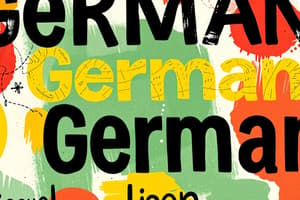Podcast
Questions and Answers
Which article is used for feminine nouns in the nominative case?
Which article is used for feminine nouns in the nominative case?
- der
- das
- die (correct)
- ein
What is the correct comparative form of 'groß' (big)?
What is the correct comparative form of 'groß' (big)?
- grosten
- großeren
- größer (correct)
- großer
Which of the following is the correct translation for 'I am fine'?
Which of the following is the correct translation for 'I am fine'?
- Mir geht's gut. (correct)
- Ich heiße gut.
- Ich bin gut.
- Ich bin prima.
Which of these terms is used to refer to a 'grandmother' in German?
Which of these terms is used to refer to a 'grandmother' in German?
What is the correct form for asking 'What is your name?' in German?
What is the correct form for asking 'What is your name?' in German?
Which verb expresses ability or capability in German?
Which verb expresses ability or capability in German?
What does 'verheiratet' mean in English?
What does 'verheiratet' mean in English?
Which sentence correctly demonstrates the verb-second rule in German?
Which sentence correctly demonstrates the verb-second rule in German?
Which of these colors is translated as 'green' in German?
Which of these colors is translated as 'green' in German?
What is the dative case preposition for 'with' in German?
What is the dative case preposition for 'with' in German?
Flashcards
German Noun Genders
German Noun Genders
Nouns in German have three genders: masculine (der), feminine (die), and neuter (das).
German Noun Cases
German Noun Cases
German nouns also have four cases: nominative, accusative, dative, and genitive, modifying their endings based on the case.
Definite and Indefinite Articles
Definite and Indefinite Articles
Definite articles (der, die, das) are used before nouns that are already known or specific. Indefinite articles (ein, eine) are used for unknown or unspecified nouns.
Regular & Irregular Verbs
Regular & Irregular Verbs
Signup and view all the flashcards
Separable & Inseparable Prefixes
Separable & Inseparable Prefixes
Signup and view all the flashcards
Modal Verbs
Modal Verbs
Signup and view all the flashcards
German Sentence Structure
German Sentence Structure
Signup and view all the flashcards
Adjective Declension
Adjective Declension
Signup and view all the flashcards
Common German Adjectives
Common German Adjectives
Signup and view all the flashcards
German Greetings
German Greetings
Signup and view all the flashcards
Study Notes
German Grammar
- Nouns: Gendered (der - masculine, die - feminine, das - neuter), cases (nominative, accusative, dative, genitive).
- Articles: Definite (der, die, das) and indefinite (ein, eine).
- Verbs: Regular and irregular conjugation, separable and inseparable prefixes, modal verbs (können, müssen, sollen, wollen).
- Sentence Structure: Subject-verb-object in main clauses; verb-second rule; subordinate clauses with verb at the end.
- Adjectives: Declension based on case, gender, and number; comparative and superlative forms.
German Vocabulary
- Common Nouns:
- Person: der Mann (man), die Frau (woman), das Kind (child).
- Objects: der Tisch (table), die Lampe (lamp), das Buch (book).
- Adjectives: gut (good), schlecht (bad), groß (big), klein (small).
- Numbers: eins (one), zwei (two), drei (three), etc.
- Days of the Week: Montag (Monday), Dienstag (Tuesday), Mittwoch (Wednesday), etc.
- Colors: rot (red), blau (blue), grün (green), etc.
Conversation Skills
- Greetings: Hallo (Hello), Guten Morgen (Good morning), Guten Abend (Good evening).
- Introductions: Ich heiße... (My name is...), Wie heißen Sie? (What is your name?).
- Common Phrases:
- Wie geht's? (How are you?)
- Mir geht's gut. (I am fine.)
- Danke! (Thank you!)
- Asking Questions:
- Wo? (Where?), Was? (What?), Warum? (Why?), Wie? (How?).
- Politeness: Use "Sie" for formal, "du" for informal.
About Family
- Immediate Family:
- der Vater (father), die Mutter (mother), der Bruder (brother), die Schwester (sister).
- Extended Family:
- der Großvater (grandfather), die Großmutter (grandmother), der Onkel (uncle), die Tante (aunt).
- Marital Status:
- verheiratet (married), ledig (single), geschieden (divorced).
- Family Relations:
- die Familie (family), die Verwandten (relatives), das Kind (child), die Eltern (parents).
Additional Notes
- Cultural Context: Understanding of social norms, greetings, and family structures in German-speaking countries.
- Pronunciation: Pay attention to umlauts (ä, ö, ü) and the sharp 'ß'.
- Practice: Engage in dialogues, watch German films, and use language learning apps to enhance skills.
German Grammar
- Nouns in German are gendered: masculine (der), feminine (die), and neuter (das) with four cases: nominative, accusative, dative, and genitive.
- Articles include definite (der, die, das) and indefinite (ein, eine).
- Verbs can be regular or irregular; they feature separable and inseparable prefixes, as well as modal verbs like können (can), müssen (must), sollen (should), and wollen (want).
- Sentence structure typically follows a subject-verb-object order; main clauses adhere to the verb-second rule, while subordinate clauses position the verb at the end.
- Adjectives are declined based on gender, case, and number, and can be transformed into comparative (e.g., größer) and superlative (e.g., der größte) forms.
German Vocabulary
- Common nouns include: der Mann (man), die Frau (woman), das Kind (child) for people; der Tisch (table), die Lampe (lamp), das Buch (book) for objects.
- Frequently used adjectives: gut (good), schlecht (bad), groß (big), klein (small).
- Basic numbers: eins (one), zwei (two), drei (three), etc.
- Days of the week: Montag (Monday), Dienstag (Tuesday), Mittwoch (Wednesday), etc.
- Common colors: rot (red), blau (blue), grün (green), etc.
Conversation Skills
- Common greetings include: Hallo (Hello), Guten Morgen (Good morning), Guten Abend (Good evening).
- Introductions typically involve phrases like Ich heiße... (My name is...) and Wie heißen Sie? (What is your name?).
- Essential phrases for conversation: Wie geht's? (How are you?), Mir geht's gut. (I am fine.), Danke! (Thank you!).
- Questions can be asked using: Wo? (Where?), Was? (What?), Warum? (Why?), Wie? (How?).
- Politeness is essential; use "Sie" for formal situations and "du" for informal interactions.
About Family
- Immediate family terms include: der Vater (father), die Mutter (mother), der Bruder (brother), die Schwester (sister).
- Extended family includes: der Großvater (grandfather), die Großmutter (grandmother), der Onkel (uncle), die Tante (aunt).
- Marital status vocabulary: verheiratet (married), ledig (single), geschieden (divorced).
- Key family relation terms: die Familie (family), die Verwandten (relatives), das Kind (child), die Eltern (parents).
Additional Notes
- Cultural context provides insight into social norms, greetings, and family dynamics within German-speaking countries.
- Pay special attention to pronunciation, especially with umlauts (ä, ö, ü) and the sharp 'ß'.
- Practice language skills through dialogues, watching German films, and using language learning applications.
Studying That Suits You
Use AI to generate personalized quizzes and flashcards to suit your learning preferences.




